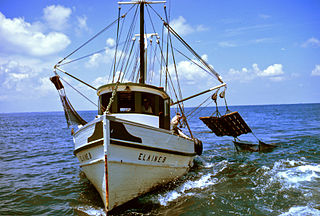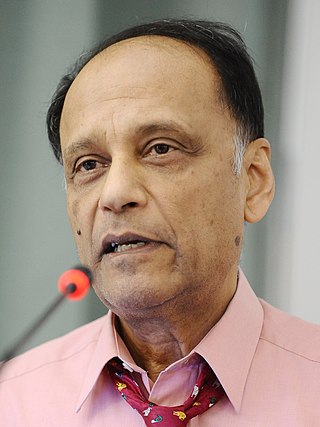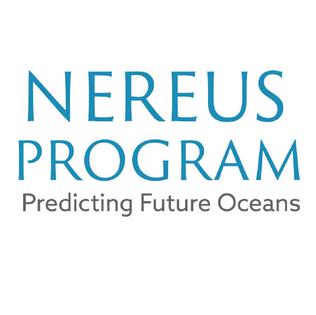Related Research Articles

Aquaculture, also known as aquafarming, is the controlled cultivation ("farming") of aquatic organisms such as fish, crustaceans, mollusks, algae and other organisms of value such as aquatic plants. Aquaculture involves cultivating freshwater, brackish water and saltwater populations under controlled or semi-natural conditions, and can be contrasted with commercial fishing, which is the harvesting of wild fish. Aquaculture is also a practice used for restoring and rehabilitating marine and freshwater ecosystems. Mariculture, commonly known as marine farming, is aquaculture in seawater habitats and lagoons, as opposed to freshwater aquaculture. Pisciculture is a type of aquaculture that consists of fish farming to obtain fish products as food.

Mariculture, sometimes called marine farming or marine aquaculture, is a specialized branch of aquaculture involving the cultivation of marine organisms for food and other animal products, in enclosed sections of the open ocean, fish farms built on littoral waters, or in artificial tanks, ponds or raceways which are filled with seawater. An example of the latter is the farming of marine fish, including finfish and shellfish like prawns, or oysters and seaweed in saltwater ponds. Non-food products produced by mariculture include: fish meal, nutrient agar, jewellery, and cosmetics.

BI Norwegian Business School is a private university college in Norway. It was founded as a private, commercial night school in 1943, offering shorter courses in business and office-related subjects for tradespeople. In 1969 it became a foundation and it was later accredited as a college and later as a specialised university-level institution, becoming Norway's second business school after the state Norwegian School of Economics.

A conventional idea of a sustainable fishery is that it is one that is harvested at a sustainable rate, where the fish population does not decline over time because of fishing practices. Sustainability in fisheries combines theoretical disciplines, such as the population dynamics of fisheries, with practical strategies, such as avoiding overfishing through techniques such as individual fishing quotas, curtailing destructive and illegal fishing practices by lobbying for appropriate law and policy, setting up protected areas, restoring collapsed fisheries, incorporating all externalities involved in harvesting marine ecosystems into fishery economics, educating stakeholders and the wider public, and developing independent certification programs.

The fishing industry includes any industry or activity that takes, cultures, processes, preserves, stores, transports, markets or sells fish or fish products. It is defined by the Food and Agriculture Organization as including recreational, subsistence and commercial fishing, as well as the related harvesting, processing, and marketing sectors. The commercial activity is aimed at the delivery of fish and other seafood products for human consumption or as input factors in other industrial processes. The livelihood of over 500 million people in developing countries depends directly or indirectly on fisheries and aquaculture.

Sir Partha Sarathi Dasgupta is an Indian-British economist who is Frank Ramsey Professor Emeritus of Economics at the University of Cambridge, United Kingdom, and a fellow of St John's College, Cambridge.

David John Teece is a New Zealand-born US-based organizational economist and the Professor in Global Business and director of the Tusher Center for the Management of Intellectual Capital at the Walter A. Haas School of Business at the University of California, Berkeley.
Mowi ASA, formerly known as Marine Harvest ASA, , is a Norwegian seafood company with operations in a number of countries around the world. The company's primary interest is fish farming, primarily salmon, the operations of which are focused on Norway, Scotland, Canada, the Faroe Islands, Ireland and Chile. The group has a share of 25 to 30% of the global salmon and trout market, making it the world's largest company in the sector. Mowi also owns a 'value added processing' unit, which prepares and distributes a range of seafood products, and a number of smaller divisions.
Sustainable seafood is seafood that is caught or farmed in ways that consider the long-term vitality of harvested species and the well-being of the oceans, as well as the livelihoods of fisheries-dependent communities. It was first promoted through the sustainable seafood movement which began in the 1990s. This operation highlights overfishing and environmentally destructive fishing methods. Through a number of initiatives, the movement has increased awareness and raised concerns over the way our seafood is obtained.

The Central Institute of Fisheries Education (CIFE) is a Deemed to be a University and institution of higher learning for fisheries science in Mumbai, India. CIFE has over four decades of leadership in human resource development with its alumni aiding in the development of fisheries and aquaculture worldwide, producing notable contributions to research and technological advancements to their credit.
This page is a list of fishing topics.

The coastline of the Russian Federation is the fourth longest in the world after the coastlines of Canada, Greenland, and Indonesia. The Russian fishing industry has an exclusive economic zone (EEZ) of 7.6 million km2 including access to twelve seas in three oceans, together with the landlocked Caspian Sea and more than two million rivers.
Seafood in Australia comes from local and international commercial fisheries, aquaculture and recreational anglers. It is an economically important sector, and along with agriculture and forestry contributed $24,744 million to Australia's GDP in year 2007–2008, out of a total GDP of $1,084,146 million. Commercial fisheries in Commonwealth waters are managed by the Australian Fisheries Management Authority, while commercial and recreational fishing in state waters is managed by various state-level agencies.

The Blue Revolution refers to the significant growth and intensification of global aquaculture production—domestication and farming of fish, shellfish, and aquatic plants—from the middle of the 20th century to the present, particularly in underdeveloped countries. The peak and subsequent stagnation of capture fishery production in the late 1980s spurred technological innovation and improved efficiency for aquaculture production.
forskning.no is an Oslo-based online newspaper established by the Research Council of Norway in 2002. It publishes news about science and research from Norway and abroad. The web site is run by Foreningen for drift av forskning.no, a non-profit organization which has 78 research institutions as members. forskning.no has its own writers and journalists and freelance writers. In addition articles are submitted by the research institutes and then edited by forskning.no staff before being published. Its English-language version is known as sciencenorway.no.
The following outline is provided as an overview of and topical guide to fisheries:

The Nereus Program is a global interdisciplinary initiative between the Nippon Foundation and the University of British Columbia that was created to further our knowledge of how best to attain sustainability for our world’s oceans. In addition to the Nippon Foundation and UBC, the program partners with University of Cambridge, Duke University, Princeton University, Stockholm University, United Nations Environment Program-World Conservation Monitoring Centre and Utrecht University. The program is built around three core objectives: to conduct collaborative ocean research across the natural and social sciences, to develop an interdisciplinary network of experts that can engage in discussion of complex and multifaceted questions of ocean sustainability, and to transfer these ideas to practical solutions in global policy forums.

Yoshitaka Ota is a social anthropologist, specializing in indigenous fisheries, climate change risk, global ocean governance, sustainable fishing business solutions, and coastal management and research communication. He is currently employed as the Nereus Program Director (Policy) and as a Research Assistant Professor for the School of Marine and Environmental Affairs at the University of Washington.

Subal C. Kumbhakar is an Indian born American economist. He is a Distinguished Research Professor of Economics at Binghamton University. He was awarded Doctor Honoris Causa, 1997, Gothenburg University, Sweden. He is a fellow of Journal of Econometrics, distinguished author of Journal of Applied Econometrics, co-editor of the Social Science Citation Index journal Empirical Economics, coauthor of a highly cited book on Stochastic Frontier Analysis. He is associated with the University of Stavanger, Norway and Inland School of Business and Social Sciences, Lillehammer, Norway. He advises Oxera Consulting LLP Oxford, UK on regulatory performance measures. He is internationally known for his research on efficiency and productivity. His models on efficiency and productivity are used by researchers worldwide.
Martin D. Smith is an American environmental economist and the George M. Woodwell Distinguished Professor of Environmental Economics at Duke University's Nicholas School of the Environment. He is known for his research on fisheries economics, marine conservation, seafood markets, and climate change impacts on coastal areas.
References
- ↑ "Professor". Archived from the original on 2013-10-31.
- ↑ "Universitetet i Stavanger CV". Archived from the original on 2013-10-31. Retrieved 2013-04-10.
- ↑ "IAAEM associate editor".
- ↑ "Fulbright Scholars Norway". Archived from the original on 2012-12-16. Retrieved 2013-04-10.
- ↑ "PLoS One paper".
- ↑ "Book: "Primary Industries Facing Global Markets"". Archived from the original on 2013-10-06.
- ↑ "Book: The Economics of Aquaculture".
- ↑ "President of IAAEM".
- ↑ "Marine Resource Economics, editors". Archived from the original on 2011-12-17. Retrieved 2013-04-10.
- ↑ "Medlemmer: ASCHE, Frank" (in Norwegian). Norwegian Academy of Technological Sciences . Retrieved 11 May 2013.